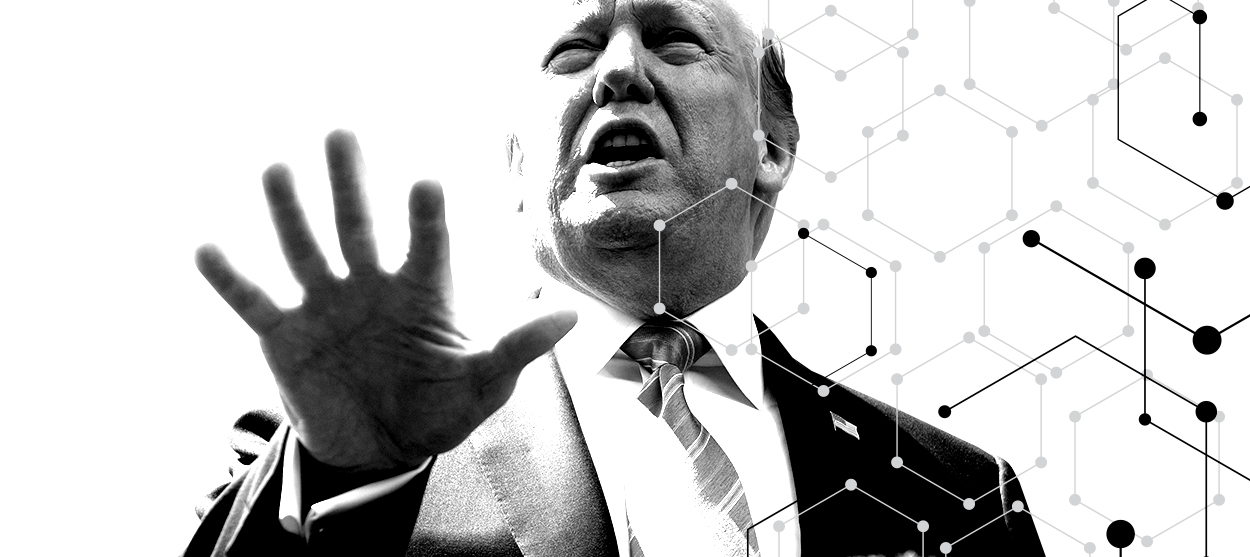The most unlikely champion of privacy rights
Trump has changed his tune on civil liberties. Please just whistle along.


A free daily email with the biggest news stories of the day – and the best features from TheWeek.com
You are now subscribed
Your newsletter sign-up was successful
President Trump did not campaign as a civil libertarian. On the trail in 2015, he went hard in the other direction, making clear he "tend[s] to err on the side of security" and endorsing a full restoration of the NSA's Patriot Act-authorized bulk data collection, which was partially curtailed by that year's USA Freedom Act.
But now, in an apparent reversal, Trump is angling to be the president who dismantles some key parts of the post-9/11 surveillance state.
It's not because he suddenly cares about privacy — at least, not your privacy. The evidence suggests Trump has become an unlikely champion of Americans' privacy rights for the simple reason that he is an American and would like his personal communications to be safe from federal snoops. This is possibly the stupidest scenario under which surveillance reform could happen, but let's not look a gift Trump in the tan line.
The Week
Escape your echo chamber. Get the facts behind the news, plus analysis from multiple perspectives.

Sign up for The Week's Free Newsletters
From our morning news briefing to a weekly Good News Newsletter, get the best of The Week delivered directly to your inbox.
From our morning news briefing to a weekly Good News Newsletter, get the best of The Week delivered directly to your inbox.
The president met Tuesday night with leading Republicans from both houses of Congress, reportedly directing them to craft a bipartisan bill that will not simply extend Patriot Act features (like the demonstrably useless phone metadata collection) ahead of a March 15 deadline. "The president made it exceedingly clear he will not accept a clean re-authorization ... without real reform," Sen. Rand Paul (R-Ky.) said after the meeting. "He was told by the attorney general, 'We can massage around the edges, and we can fix this through regulation,' [but] the president didn't accept that, pushed back very vigorously and said, 'We're not doing this.'"
For Paul, a longtime mass surveillance critic, this is a matter of constitutional principle. He was the sole Republican to vote against Attorney Gen. William Barr, his rival in the present battle for Trump's will, on the grounds that Barr is a "chief advocate for warrantless surveillance of U.S. citizens." Paul regularly speaks against metadata collection, calling it a "bullshit" security measure, and wants to end the use of warrants from the Foreign Intelligence Surveillance Amendment (FISA) court — originally intended to monitor foreign spies — to surveil U.S. citizens.
"FISA warrants should not be issued against Americans. Americans shouldn't be spied on by a secret court," Paul argued this past Thursday. "I think [Trump] agrees completely with that."
I think that's true, if by "Americans" we mean "Donald J. Trump."
A free daily email with the biggest news stories of the day – and the best features from TheWeek.com
The president has tweeted the word "privacy" precisely twice ever, both times reducing big topics — NSA metadata collection and Fourth Amendment rights — into entirely Trump-centric concerns. And we know exactly why the FISA court came on his radar as a Bad Thing: It was used to spy on his campaign with incompetent and unethical practices by the FBI, as the Justice Department's inspector general reported in December.
The DOJ report identified 17 "serious performance failures" in the FBI's process of obtaining of FISA warrants connected to the Trump campaign. This isn't the partisan malfeasance Trump has railed about for months, nor is it the unique conspiracy he seems to imagine. It's just how the FISA court operates. From 1979 to 2013, the court rejected only 11 of nearly 34,000 surveillance requests, a rate of 0.03 percent. In the last few years, the court has grown comparatively stringent, increasing its rejection rate all the way to 0.11 percent.
And it's impossible to say exactly what the FISA court has permitted thanks to its secretive organization. "FISA's inherent secrecy causes a chain reaction," explains cybersecurity reporter David Ruiz at the Electronic Frontier Foundation. "Because the [court's] surveillance orders are kept secret, it is hard to know if they are ever improper. Because criminal defendants are kept in the dark about what evidence was used to obtain a FISA order, they cannot meaningfully challenge if the order was wrongly issued."
With numbers and conditions like these, it's inconceivable the Trump-related application was the first to be approved with "serious performance failures." Indeed, we have every reason to think there's nothing wildly unusual about what happened to Trump's campaign. Still, if that's the case which gets us to meaningful surveillance reform — well, I'll take it.
The president is interested in privacy right now because he thinks he's been subjected to special harassment. That's at best partially correct, and it has not produced a broader ethic of civil libertarianism in Trump, no matter how hard Paul tries to push him there. In a sense, Trump's demand for reform here isn't a reversal at all: He's changed his stance on the policy, but his core commitment to himself is as consistent as ever.
Bonnie Kristian was a deputy editor and acting editor-in-chief of TheWeek.com. She is a columnist at Christianity Today and author of Untrustworthy: The Knowledge Crisis Breaking Our Brains, Polluting Our Politics, and Corrupting Christian Community (forthcoming 2022) and A Flexible Faith: Rethinking What It Means to Follow Jesus Today (2018). Her writing has also appeared at Time Magazine, CNN, USA Today, Newsweek, the Los Angeles Times, and The American Conservative, among other outlets.
